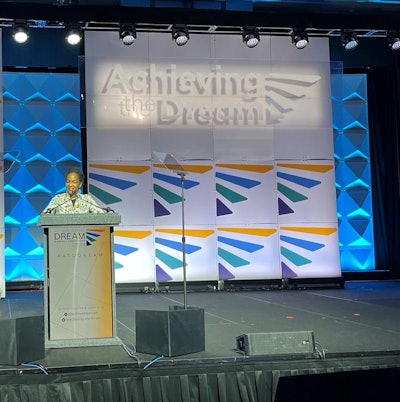ORLANDO—
Achieving the Dream (ATD), the national reform network of more than 300 community colleges committed to increasing student success, kicked off its annual convening this week showcasing the powerful narrative of its member institutions.
College presidents, senior leaders, faculty and students have come to this year’s conference with the goal of sharing best practices on how they’ve transformed their institutions to benefit students.
Harry S. Truman College and Richard J. Daley College—both part of the City Colleges of Chicago system—are the latest institutions to join the ATD Network.
“For 20 years ATD’s fundamental commitment has been to help our colleges build new capacities, systems, and processes to address institutional barriers that prevent students, especially racially and economically marginalized learners, from entering and leaving our institutions with a credential of value for themselves, their families, and their communities,” said Dr. Karen A. Stout, president of ATD. “Activating the talent and potential of all learners, through the partnership with all seven City Colleges of Chicago, is urgent work. This is especially critical in Chicago, a highly diverse community that is an economic powerhouse in our country but where structural inequities in access to and completion of a post-secondary credential of value put countless lives at risk.” Dr. Imani Perry delivers keynote address at the Achieving the Dream convening in Orlando, Florida.
Dr. Imani Perry delivers keynote address at the Achieving the Dream convening in Orlando, Florida.
ATD activates coaches to help institutional leaders formulate action plans for achieving demonstrated outcomes around student success. Embedded in its work is a concentrated focus on equity and inclusion.
“The founders of ATD met the moment. They found a purpose that could spark innovation and focus across an entire sector of higher education. This is now our moment,” said Stout. “Can we continue to reinvent our colleges and communities to be more equitable places that secure the future for another 20 years and beyond? I know, as I look out across the room full of wonderful educators and leaders, that this future is attainable.”
During the opening plenary, Harvard University’s award-winning professor, Dr. Imani Perry lauded the work of ATD and member institutions, whose faculty and administrators work hard to center the experiences of students despite mounting obstacles and challenges.
“Our work is not only to believe in our students and to fight for opportunity but to be honest about the adversity that they and we continue to face,” said Perry. “And honesty is evident in not only what we do when we’re doing career counseling and career services work but also in how we teach our collective stories as well as our histories.”
The author of South to America: A Journey Below the Mason-Dixon to Understand the Soul of a Nation, and May We Forever Stand: A History of the Black National Anthem, Perry’s keynote examined the intersections between race, history, justice and community and higher education.
Fond Du Lac Tribal and Community College (FDLTCC) in Minnesota was the recipient of this year’s Leah Meyer Austin Award. The award is the highest distinction a college in the ATD Network can earn. ATD bestows this award annually to a college that employs a holistic approach to reducing equity gaps between student groups and increasing success for all.
“One of the major reasons we stand here before you is ATD and the work they have done to support us over the last six and a half years,” said FDLTCC President Dr. Anita Hanson. “The work that everybody in this room is doing to improve student success for all the various groups we work with is not easy work, but I tell you it’s the most rewarding work in the world.”





















